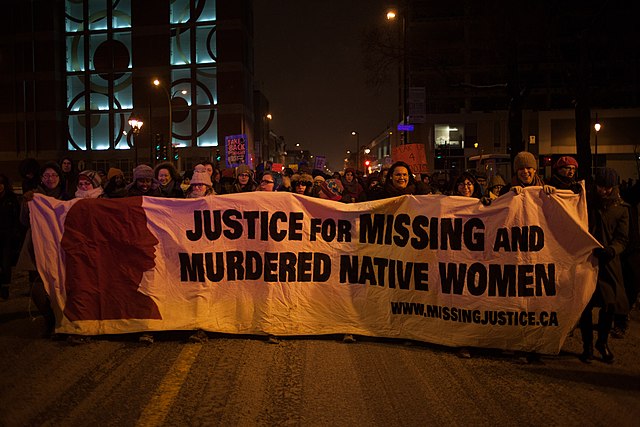Who aren’t we looking for?
The case of Gabby Petito & Indigenous women
April 4, 2022
Disclaimer: This article is not intended to disenfranchise any group or family members who are suffering. My intention is to bring light to a movement fighting for visibility and equality. The goal of the Dakota Student and it’s staff is to inform rather than spread misinformation. While this is an opinion piece, that fact still rings true. If any of this information is outdated or incorrect please contact me and we will make corrections accordingly and as quickly as we can.
How often do you see media coverage of missing persons? In 2021 the case of missing person Gabby Petito experienced widespread coverage across nearly every major platform; including, but not limited to, USA Today, Fox News, CNN, NBC, and various other big name stations. Over the past decade, there have been over a thousand missing person cases. Since 2016, 5,712 of these cases have involved missing indigenous women, 400 – 700 of these individual cases have been from within the state of Wyoming, where Petito went missing. There has been little coverage and urgency regarding the hundreds of other women.
Many minorities, specifically indigenous people, are not receiving equal urgency or due diligence. The efforts of the MMIW (Missing Murdered Indigenous Women) movement is not about dismissing the suffering of others or their families. It is about seeking equality within media exposure at the same level of seriousness or action. There are thousands of indigenous people suffering because of the loss of their family, friends, and community members. Their stories are not being shared. Their people and their stories are being given so little attention. The duty that this country has to protect its citizens is very blatantly not being extended indigenous people or tribal communities, not in the same way it rushes to bring justice to certain majorities.
Violence against Native American women and young girls occurs at a rate ten times higher than the national average. As of last year, Indigenous people contributed to around 31% or higher of this nation’s missing person cases. These atrocities are often committed by abusers, rapists, or human traffickers; and a majority by non-native individuals within native territories. Only 116 cases have been filed through the US Department of Justice’s missing person database, due to both negligence and misclassification of race. There are organizations out there working towards collecting an accurate database of missing or murdered indigenous persons cases. Dishearteningly, there is still not enough action being taken to solve these cases, murders, and acts of hate towards indigenous communities.
There are explicit biases within not only the media but also within the negligence of government and police forces. However, there are a handful of other issues regarding this irresponsibility and neglect. The majority of reservations across the United States experience tribal sovereignty; which is the right of American and Alaskan natives to govern themselves. While this allows reservations a lot of protections, it presents many issues regarding violence against native women aligned with these missing person cases. With the current crisis MMIW presents, there are several reforms that need to be made between federal and tribal law. Many of these laws and policies are from the colonial-era, so you can image they are not only incredibly outdated but also stand to represent the degradation and suffocation of indigenous cultures.
There has been a lot of attention falling on groups like MMIW, such as the Sovereign Bodies Institute, and the Coalition to Stop Violence Against Native Women; and many others. However, this may not be enough. It might not be enough until over a hundred thousand voices take to the wind, raising awareness of this crisis and working towards real change within tribal and governing bodies. Change will come when tribal nations are given proper resources, full authority, and support to protect native women, girls, and two-spirits. You can make a difference by becoming more educated about these issues and this crisis. By learning and spreading awareness you are consciously assisting in creating a larger safety net for change and equality. I used to believe that one voice or one vote could not make a difference, but when you carry your voice with a million other voices at your side, you can move mountains.
Page Break
Resources:
- https://www.bia.gov/frequently-asked-questions
- https://mmiwusa.org/
- https://www.greatfallstribune.com/story/news/2021/09/23/gabby-petito-indigenous-people-point-out-disparities-missing-white-woman-syndrome-mmiw/5827651001/
- https://www.niwrc.org/restoration-magazine/june-2020/mmiw-understanding-missing-and-murdered-indigenous-women-crisis
- https://www.youtube.com/watch?v=mdPv0NDfMbA&list=LLcd762OUcYrdN5mMN0ceTaQ&index=19
- https://www.youtube.com/watch?v=25RSLxVCgnc&list=LLcd762OUcYrdN5mMN0ceTaQ&index=20
- https://www.youtube.com/watch?v=ib0GDAPeymo&list=LLcd762OUcYrdN5mMN0ceTaQ&index=21
Demetria Slyt is a Dakota Student Opinion Writer. She can be reached at [email protected].


